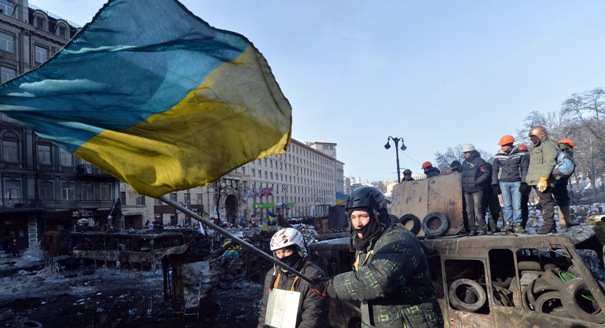Ukraine—one of the Europe’s largest states, which has every right to be called European—is in in the midst of a revolution. The Ukrainian people openly rebelled against the regime, and the greater part of the country is now affected by the unrest. The regime lost control of the situation; the system of governance is essentially destroyed. President Viktor Yanukovych’s disregard for the protesters’ demands only exacerbate the confrontation between the regime and significant part of the population.
There is every reason to conclude that the Yanukovych regime is doomed. It can temporarily restore its control over some parts of the country only by resorting to violence and dictatorial rule. This spells mass bloodshed. For Yanukovych, actually agreeing to the Maidan’s demands—early presidential and parliamentary elections—is tantamount to losing power; he will not be able to win fair elections. So Yanukovych is trying to buy time, which only intensifies the already fierce confrontation. Moreover, there is “the third power” in this conflict—it is the Kremlin. By providing Yanukovych with financial assistance, the Kremlin effectively became an essential support factor for the sinking Ukrainian regime. Thus, the situation in Ukraine has already acquired international dimension.
However, at some point, Yanukovych and his team have apparently started to realize that a tactical change is in order. On January 25, Yanukovych offered the opposition a deal with two clear goals in mind. First, he wanted to split the opposition trio of Klitschko-Yatsenyuk and Tiahnybok and drive a wedge between the trio and the Maidan protestors. Besides, he wanted to buy some time by promising small concessions but retaining control over the concession-making process. Yanukovych offered the office of prime minister to Arseniy Yatsenyuk and an ambiguously-defined position of vice prime minister to Vitali Klitschko, thus ignoring Oleh Tiahnybok. He did not agree to completely repeal the dictatorial laws, eschewing the questions of early elections and reverting to the 2004 Constitution. The opposition returned to the Maidan and openly rejected the deal with Yanukovych.
Thus, the Maidan’s demands remain in effect. They are the repeal of the dictatorial laws, the early presidential and parliamentary elections, the return to the 2004 Constitution, removing the Berkut special forces from Kiev, and the release of political prisoners. The next few days, particularly the January 28 emergency session of the parliament, will clarify Ukraine’s future trajectory—the country will either continue drifting to further confrontation or Yanukovych will have to yield.
It is hard to predict the next turn of events in Ukraine’s ongoing revolutionary struggle. But we can already draw certain conclusions about some major trends in the Ukrainian drama.
- Ukraine is suffering from the crisis of the post-Soviet model, which is also prevalent in other post-Soviet states, and can no longer respond to the modern challenges. For a number of reasons, Ukraine has become a weak link.
- Yanukovych’s refusal to sign the Association Agreement with the EU and, more importantly, the violence the special forces perpetrated against the Maidan protestors, have triggered the active stage of the crisis.
- Yanukovych has tried to restore control by resorting to dictatorial rule through the passage of repressive legislation on January 16. These actions signaled the onset of the anti-constitutional coup d’état.
- This coup has elevated the conflict from the state of peaceful confrontation of opposition and the regime to the state of resistance to the regime. Both sides now act outside of the legal realm.
- The Ukrainian popular protest runs ahead of the opposition consolidation. The Maidan at the moment is lacking recognized leadership that can present a strategy of overcoming the crisis.
- Having rejected concessions at the earlier stage, the regime itself provoked radicalization of the protest. Now the Maidan does not just demand government resignation; it asks for the early elections for both the president and the Rada. Moreover, some in the protest community understand that the mere regime change is not sufficient; the rules of the game also have to be changed through the process of drafting the new Constitution.
- The Maidan evolution has reached a turning point—it is now trying to create alternative governing bodies—its own Rada. However, the Maidan is yet to resort to calling for the national strike—the most effective instrument of fighting the regime.
- Yanukovych is still retaining his power base—local administrations (albeit not in every region), the Berkut, and the Party of Regions. It is still unclear how loyal the army is to Yanukovych. But to an even greater extent, Yanukovych owes his survival to the weak opposition and vacillating oligarchs who are afraid to join the opposition ranks. Finally, let us not forget perhaps the most powerful factor—that of the Kremlin’s support.
- At the time of this writing, neither of the two opposing forces could prevail in the conflict. But if Yanukovych does not accept the Maidan’s demands, the standoff could spill over into a violent confrontation and the regime’s attempt to decimate the Maidan. Yanukovych has gone too far to back down. On the other hand, sweeping the Maidan clean will bring about civil war, since a significant segment of society repudiates the regime.
- What role is the West playing in all of this? It is completely paralyzed and unable and unwilling to influence either Yanukovych or the Kremlin. The opposition would probably accept Western mediation in its dialogue with Yanukovych. But such a dialogue must revolve around repealing the repressive legislation and scheduling early elections.
- Whatever happens in the near future, Ukraine is in for a long ordeal that has just begun. The previously dormant segments of Ukrainian society are getting involved in this process. Meanwhile, the regime is stepping up its resistance. Fearing the prospects of retribution, it is ready to defend itself by any available means.
- Any turn of events in the Ukrainian saga will have European and international ramifications, which we cannot predict right now. But it is time to start thinking about them.





.jpg)